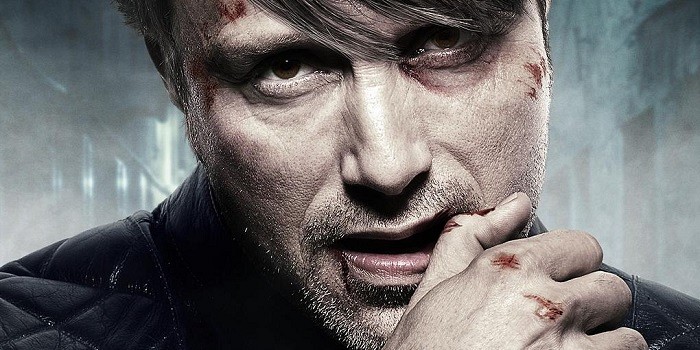
Watching NBC's bloody and baroque Hannibal adapt Thomas Harris' Red Dragon over the last five weeks has felt a lot like seeing one of your favorite current bands cover one of your all-time favorite songs. Obviously it's awesome, but it's also a bit jarring, as you're hearing notes and chords you know by heart, but interpreted just differently enough to create this odd sort of disassociation. It's a little weird! But still delightful.
Actually, "delightful" is a good word to describe Hannibal at large. Two years ago, I wrote a piece for this very site begging NBC to renew the series after its impressive but low-rated first season. NBC complied, and then again when they renewed it for season three which wraps up with Saturday's episode. Unfortunately, ratings went from bad to worse, and the show's intense cult following was no longer enough to keep the network interested. So the season finale — tantalizing titled "The Wrath of the Lamb" — will double as the show's series finale. (There was hope it might get picked up by Netflix or Amazon or somebody, but the costs proved too high for another content provider to bite.)
Honestly, the show ending sucks but it doesn't. On one hand, yeah, I want this great series to run for four more years. I want to see what happens to Hugh Dancy's Will Graham after he suffers the totality of the Red Dragon storyline. I want to know what stories creator and showrunner Bryan Fuller would concoct to keep Graham and Mads Mikkelsen's Hannibal Lecter circling each other when there's no longer any source material to guide the way. And I definitely want to see this creative team tackle The Silence of the Lambs, still the definitive Lecter story for many. (I know he's mentioned Ellen Page for Clarice. How great would that be?!) It's always a bummer when ratings force a good show off the air before its creators intend to be over. This case is no different.
But at the same time, it's not a terrible place for the show to end. Three years ago, Fuller set out to tell the story of Hannibal and Will that occurred before Lecter found himself caged behind glass in a mental institution. That was the hook, and that story's natural ending occurred midway through this season when Lecter, desperate to ensure that he forever remains close to the front of Will's mind, willingly turned himself into the FBI. Had that episode served as the series finale, it would have been a thematically sound concluding chapter. The fact that we got a six-episode sequel — the third (!) filmed take Harris' original Lecter novel — is really just gravy. And, look, I love Michael Mann's Manhunter. As far as thrillers go, it's tough to top. But these last six episodes weren't made to compete with it (or with Brett Ratner's less good, Anthony Hopkins-infused Red Dragon remake). They were made to tell a familiar story using this series' patented dreamlike style. Yes, it's a cover song, but it's a cover song played Fuller's way, with as many deviations as he wants to make. (And there have been a few surprising ones. Poor Chilton!)
There are other reasons we shouldn't weep too much for Hannibal. The producers still hadn't secured the rights to Silence needed for Fuller to film his adaptation. Perhaps they never would have, leaving a void that would become increasingly distracting as the show went on. Finishing up now also allows this creative team to move onto other exciting things. Fuller is adapting Neil Gaiman's American Gods as a series for Starz. Mikkelsen will apear in Rogue One, the first Star Wars spinoff movie, and is currently rumored to be in negotiations for a major — likely villainous — role in Marvel's Doctor Strange. (Which is good. Mads needs some franchise love. Dude deserves to be in everything for a while. Have Vin Diesel's people call his people for Fast and Furious 8 while we're at it. And you just know the gifs sprung from any Cumberbatch/Mikkelsen scenes in Strange would likely cause Tumblr to burn itself to the ground.)
Ultimately, Hannibal is similar to a fine meal (of which we saw many on the show, provided you didn't think too hard about the ingredients). Sure, you'd like to eat more. But maybe it's better to just stop now and appreciate it before you stuff yourself too much, leaving the dinner table on a note of regret. That way, you can think back on it fondly.
I'll remember the times I rewound and turned on the closed captioning just so I could be clear on every single delectable word coming out of Mads' mouth. (That accent really could be tricky at times.) I'll remember all of those imaginatively grotesque murder scenes, along with the spine-tingling, Lynch-ian dream visions of men turned into stags and dragons. Perhaps no television show ever has offered up images of violence and horror as striking as this one. I'll remember how it took pop-culture characters we were all overly familiar with and twisted them into interesting and original creations.
Hannibal wasn't just a great TV show, it was something far rarer — a great horror show. The Walking Dead is the giant, cross-demographic hit but feels boringly meat and potatoes next to Hannibal's finer cuisine. Both the genre and television as a whole will suffer in the latter's absence. We will get hungry for this type of show again. There is that Twin Peaks revival on the way. I always thought that show's original run had to be one of Fuller's biggest influences while making Hannibal. Seems fitting that it would be the show to pick up the slack once Hannibal is gone.











